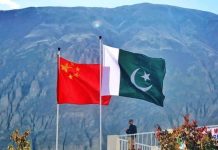Ties: President says small circles can’t solve global issues
BEIJING: President Xi Jinping stressed on Monday the need for China and Australia to build up mutual understanding and trust through peaceful coexistence and achieve common development through win-win cooperation, during a meeting in Beijing with Australian Prime Minister Anthony Albanese.
Xi told Albanese, who is marking the first visit to China by an Australian prime minister since 2016, that the two nations should fully tap into the potential of the China-Australia Free Trade Agreement, expand cooperation in areas such as climate change and the green economy, and uphold the global and regional free trade system.
The president noted that the visit by Albanese can be seen as a continuation of past interactions between both sides and a new beginning, as this year marks the 50th anniversary of Gough Whitlam’s visit to China — the first visit to China by an Australian prime minister.
The two nations have resumed exchanges in various sectors and embarked on the correct path of improving and developing their relationship, Xi said.
Relations between China and Australia had stumbled in recent years amid trade issues and other challenges.
Trade between the two nations dropped 3.9 percent year-on-year to $220.9 billion last year, even though China remained Australia’s largest trading partner and the biggest market for Australian exports.
Xi said that China and Australia, both countries in the Asia-Pacific and members of the G20, share no historical grievances or fundamental conflicts of interest, adding that the two sides can become partners who trust each other and facilitate each other’s development.
It is also important to grasp the right direction of China-Australia relations amid the profound changes in the global situation, Xi told his guest.
The Chinese president pointed out that if a nation only prioritizes its national interests, the world seems small and crowded, and full of risks and competition.
However, if viewed from the perspective of a shared future, the world is vast and abundant, and full of opportunities and cooperation. In the tumultuous waves of global crises, the countries in the world are not each riding in more than 190 small boats but on a shared big vessel, he added.
Xi called on the two nations to follow the trends of the times, building a relationship based on equality, seeking common ground while reserving differences, pursuing mutual benefit, and continuing to advance the bilateral comprehensive strategic partnership.
Faced with a complex external environment, the Chinese economy has withstood the pressure, stabilized its scale and improved its quality, he said, adding that China’s development is still built on a solid foundation and many favorable conditions.
China’s stable development brings much-needed certainty to the world economy. China’s development cannot be separated from the world, and the world’s development also needs China, he added.
Xi pointed out that actions seeking to build “small yards and high fences”, decoupling or de-risking are in essence all forms of protectionism that go against the laws of the market, technological development and the trends of development in human society.
He made an appeal for both nations to provide a favorable business environment for the investment and operation of enterprises in both countries.
The two governments should support exchanges between legislative bodies, political parties, think tanks and youth, and at subnational levels, facilitate easier exchanges of personnel, and enhance mutual understanding and friendship between the two peoples, Xi said.
China does not form exclusive small circles, or engage in group politics or bloc confrontation in the Asia-Pacific region, the president said, adding that small circles cannot solve the major challenges facing the world.
Both nations should be vigilant against and oppose any attempts to disrupt the Asia-Pacific region, he said.
He also expressed readiness to carry out more trilateral and multilateral cooperation with Australia and support South Pacific countries in enhancing their development resilience and addressing challenges such as climate change.
Albanese, who is making his seventh visit to China and his first as prime minister, said both sides should respect each other, seek mutual benefit, maintain communication and exchanges, enhance understanding and cooperation, and achieve mutual benefit and win-win results.
He said it is natural for Australia and China to have differences, but the two sides should not let the differences define their relationship.
The two nations, with their broad shared interests, should see dialogue and cooperation as their right choices, he said.
Canberra is willing to actively promote the stable development of bilateral relations with Beijing, enhance economic and trade exchanges, and strengthen cooperation in areas such as clean energy and climate change, to bring more benefits to the peoples of both countries, he added.
On Monday, the president also held separate meetings with leaders from Cuba, Serbia and South Africa at the Great Hall of the People.
-The Daily Mail-China Daily News Exchange Item





